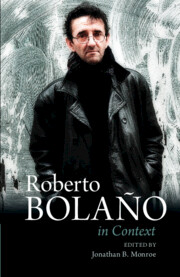Book contents
- Roberto Bolaño in Context
- Roberto Bolaño in Context
- Copyright page
- Contents
- Contributors
- Chronology
- Part I Geographical, Social, and Historical Contexts
- Part II Shaping Events and Literary History
- Part III Genres, Discourses, Media
- Chapter 16 Essays and Short Stories
- Chapter 17 Poetry I: The Ghost That Runs through the Writing
- Chapter 18 Poetry II: Parody and the Question of History
- Chapter 19 The Novel and the Canon
- Chapter 20 Detective Fiction
- Chapter 21 Journalism, Media, Mass Culture
- Chapter 22 Literary Criticism and Literary History
- Part IV Aesthetics, Culture, and Politics
- Further Reading
- Index
Chapter 16 - Essays and Short Stories
from Part III - Genres, Discourses, Media
Published online by Cambridge University Press: 15 December 2022
- Roberto Bolaño in Context
- Roberto Bolaño in Context
- Copyright page
- Contents
- Contributors
- Chronology
- Part I Geographical, Social, and Historical Contexts
- Part II Shaping Events and Literary History
- Part III Genres, Discourses, Media
- Chapter 16 Essays and Short Stories
- Chapter 17 Poetry I: The Ghost That Runs through the Writing
- Chapter 18 Poetry II: Parody and the Question of History
- Chapter 19 The Novel and the Canon
- Chapter 20 Detective Fiction
- Chapter 21 Journalism, Media, Mass Culture
- Chapter 22 Literary Criticism and Literary History
- Part IV Aesthetics, Culture, and Politics
- Further Reading
- Index
Summary
The coincidence between the events on 9/11 in Santiago in 1973 and New York in 2001, earlier observed by Ariel Dorfman, lends itself to an analysis of the spiral of Bolaño’s oeuvre from the trauma of the 1970s Chilean dictatorship to the neo-globalizing moment that overlapped with the world dissemination of Bolaño’s work. Bolaño is nostalgic for the Allende era in Chile when meaningful social change seemed possible. Yet he is conscious that it was the authoritarian force and neoliberal economics of the Pinochet regime that was truly prophetic of the future. The nostalgic and the counterfactual, the elegiac and recursive, intertwine as Bolaño looks back on his generation’s odyssey and sees analogies for its trauma in the femicides of 2666. A nodal point of this intertwining is the tenth anniversary of the coup on September 11, 1983, where a group of “masochistic Chileans” meet in Paris in The Savage Detectives, poised between a past they never knew and a future they can scarcely envision. Bolaño knows he has to face the necropolitics of the then-present and not the nostalgia of the deferred past; yet the dream of the Allende era is never entirely renounced in his oeuvre.
- Type
- Chapter
- Information
- Roberto Bolaño In Context , pp. 181 - 190Publisher: Cambridge University PressPrint publication year: 2023

